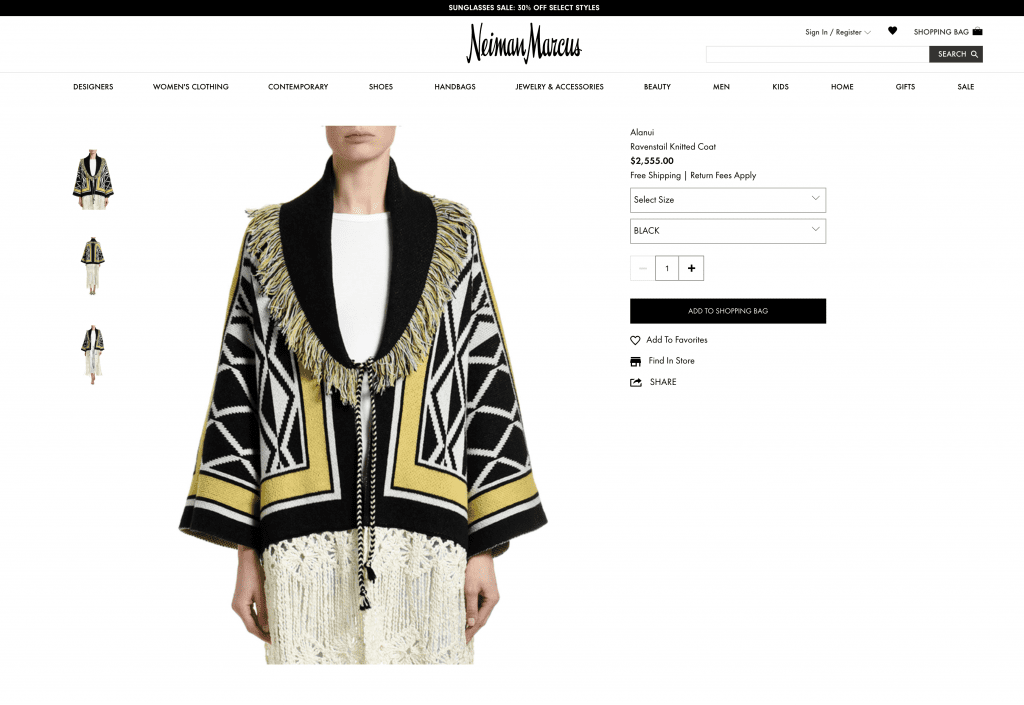Neiman Marcus, MyTheresa, and Farfetch “have agreed to the key terms of settlement” in the case that the Sealaska Heritage Institute, Inc. (“SHI”) filed against them for making and/or selling a $2,500-plus knitted coat that allegedly violates federal copyright law, as well as the Indian Arts and Crafts Act (“IACA”) and the Alaska Unfair Trade Practices and Consumer Protection Act, in part because the Alanui-branded “Ravenstail Knitted Coat” was sold “in a manner that falsely suggests it was produced … by an Indian or Indian tribe” when it was not.
According to the complaint that it filed in a federal court in Alaska in April against Neiman Marcus, MyTheresa, Farfetch, and New Guards Group, among others, the SHI – a nonprofit that was “established to perpetuate and enhance the Tlingit, Haida, and Tsimshian cultures of Southeast Alaska” – claimed that the fashion industry defendants were selling the allegedly infringing sweater, which not only hijacks a copyright protected pattern, but also co-opts the name of a “specific, defined, and famous style of weaving and pattern” that is associated with Native American groups, namely, the Tlingit, Haida, and Tsimshian, thereby, violating a number of federal and state laws, including the IACA.
Due to the “substantial copying” embodied in the Alanui sweater, which comes directly from a woven piece of art, called “Discovering the Angles of an Electrified Heart” created by Clarissa Rizal, “an Alaska Native resident,” SHI claimed in its complaint that Italian fashion brand Alanui – which is at least partially owned by buzzy Italian entity New Guards Group, and which was subsequently added as a defendant to the case by way of an amended complaint in August – and the retailer defendants are violating federal copyright law by selling it.
This same conduct also gives rise to a violation of the Alaska Unfair Trade Practices and Consumer Protection Act, according to SHI’s complaints, as Rizal’s work is “an authentic piece of Alaska Native handicraft created by a resident of Alaska,” and thereby, protected against such alleged “unfair methods of competition, and unfair or deceptive acts or practices in the conduct of trade.”
Despite such protection against misrepresentation provided by the Alaska Unfair Trade Practices and Consumer Protection Act and the IACA, that is precisely what Alanui and co. did, according to SHI, when it sold the lookalike sweater under the “Ravenstail” name, which “has for hundreds of years exclusively identified Tlingit, Haida, and Tsimshian products, specifically a textile woven in a specific manner and with a certain design,” and thus, “exclusively identifies products made by the Tlingit, Haida, and Tsimshian peoples.”
Since “the defendants are not Indians, Indian Tribes, or Indian Arts and Crafts organizations as defined by IACA,” their sale of the sweater under the “Ravenstail” name is a violation of the IACA, according to SHI, which argued that after learning that the defendants were selling the sweater back in August 2019, it alerted Neiman Marcus – by way of its “online customer service mechanism” – of the “problematic and improper nature of the product.” However, despite “being made aware of the impropriety of their actions,” SHI claimed that “the defendants continued to offer for sale and sell the infringing and offensive products,” and in at least some cases, are still doing so.

With the foregoing in mind, SHI set forth claims of copyright infringement, false designation of origin, and violations of the IACA and Alaska Unfair Trade Practices and Consumer Protection Act, and is seeking no small amount of damages. In connection with the IACA claim, alone, SHI argued that it is entitled to “not less than $1,000 for each day that the ‘Ravenstail Knitted Coat’ was sold, or offered or displayed for sale, for each aggrieved individual Indian, Indian tribe, or Indian arts and crafts organization.” Moreover, the IACA states that if a business violates the Act, it can face civil penalties of up to $1,000,000.
In response to the SHI’s amended complaint, Neiman Marcus and MyTheresa argued that the non-profit’s “hollow labels and vague group pleadings” that aim to establish personal jurisdiction over them fall flat. “Tellingly, [SHI] alleges that the ‘defendants’ are subject to personal jurisdiction in Alaska because they ‘misappropriated intellectual and other property directly from the plaintiffs who are located in this judicial district.’” But … NMGI claims, SHI’s “subsequent allegations exclude NMGI and MyTheresa from the alleged copying, attributing it to other defendants instead,” namely, Alanui, Ms. Oddi, New Guards, and Farfetch.
“The plaintiffs do not actually allege that Neiman Marcus Group, Inc. stole, advertised, offered, or sold any coats,” the retailer asserted in its September 2020 Motion to Dismiss. “Indeed, it is beyond dispute that Neiman Marcus Group, Inc. is a holding company that does not conduct retail sales operations of any kind.”
As such, Neiman Marcus argued that the court lacks “specific jurisdiction over” it and MyTheresa because it was SHI that “placed orders with Neiman Marcus Group, Inc. and MyTheresa to send [the] infringing coats to this District.” And even if SHI had “plausibly alleged that NMGI undertook any of the specific acts described in the amended complaint,” Neiman Marcus and MyTheresa assert that the “allegations [do] not support jurisdiction over Neiman Marcus Group, Inc. or MyTheresa because they rely solely on the plaintiffs’own conduct.”
Now, almost eight months after the case was first filed and before the court has ruled on Neiman Marcus’ Motion to Dismiss, the parties have asked the court to stay the case temporarily, as they “are engaged in ongoing discussions regarding the details of a settlement agreement.” Accordingly, the parties say that they “believe that, in the interest of efficiency and judicial economy, good cause exists to stay this action, including any service of process obligations, to allow the parties time to finalize a settlement agreement.”
In the December 11 filing, the SHI and Neiman Marcus Group, Inc., MyTheresa.com, GMBH, and Farfetch.com US, LLC “respectfully request that the Court stay this matter until at least January 29, 2021, by which time the parties anticipate a finalized settlement and a forthcoming Rule 41 dismissal.” If the action has not been dismissed by January 29, 2021, the parties say that they will file a status report on that date.
*The case is Sealaska Heritage Institute, Inc., v. Neiman Marcus Group LTD, LLC, et al., 1:20-cv-00002 (D. Alaska).











